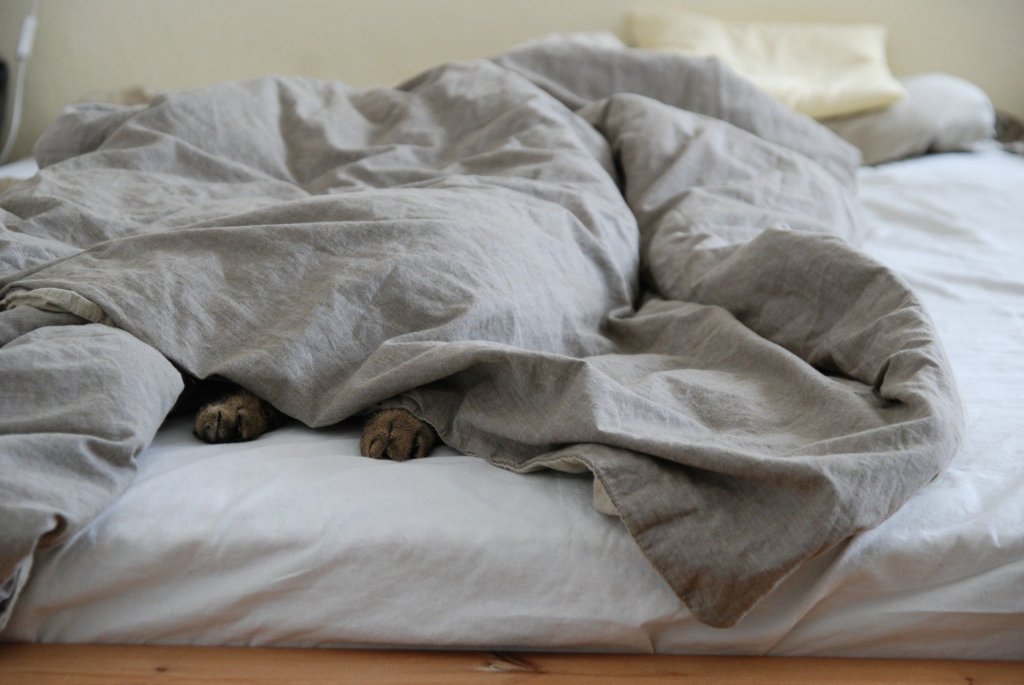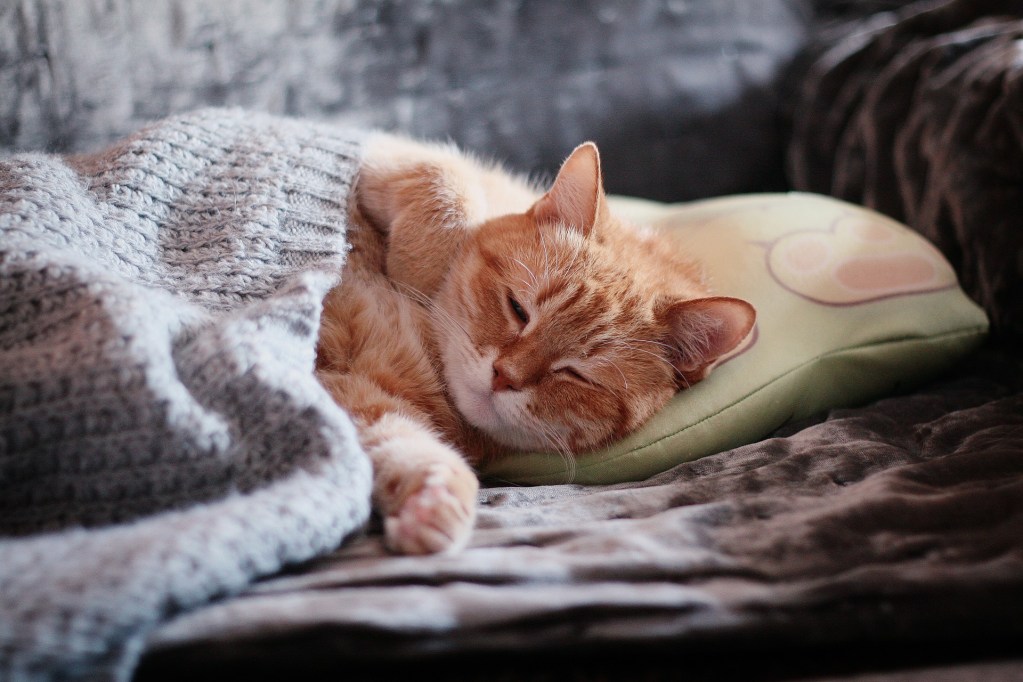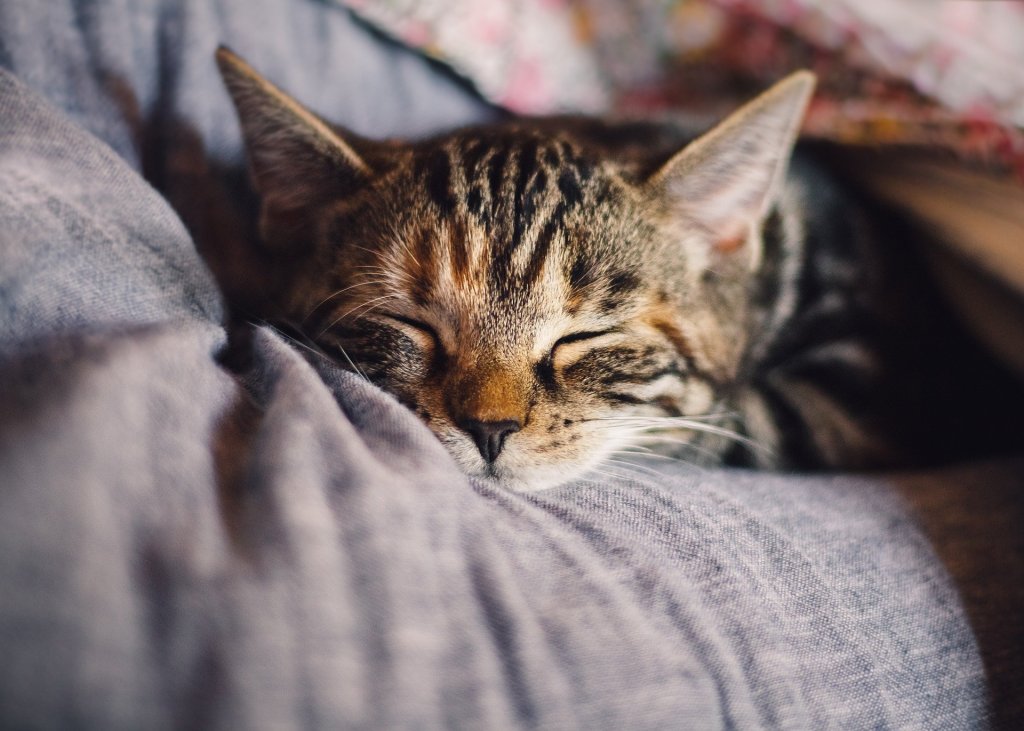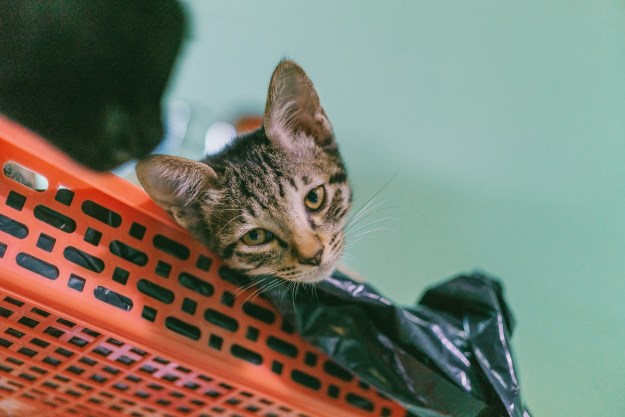
If your cat sleeps under the covers with you, you’re not alone. While having your fur baby curled up against you sounds like a cozy way to fall asleep, it’s not always good for your sheets — or your health. Not only can cats leave behind some of their hair, but there’s also the possibility that they’ll bring in traces of litter into your bed. Yuck!
If you don’t want your cat under the covers with you, or if you’re worried that it might be unsafe, then this is the guide for you. We’ll walk you through all the reasons your cat sleeps under covers with you and what you can do to discourage it.

Why does my cat sleep under the covers?
You may be wondering why your cat sleeps under the covers. Here are the six most common reasons, as well as some suggestions to help you put a stop to this habit.
1. It’s warm and cozy
Your cat may seek out the bed because it’s a warm and cozy sleeping spot. He might just be snuggling up for a nap and knows that under the covers is the warmest place.
What to do: To discourage this, consider giving your kitty a cat bed in a warm and cozy spot of his own, like in a sunny window or near a heating element. You can also give him a heated cat bed, which will help keep him toasty.
2. Your cat wants to play
Some cats who get under the covers are looking for a chance to play. This can be particularly true if your cat burrows under the covers while you’re trying to make the bed, and then rolls or races around as you adjust the sheets and blankets. Your cat is probably feeling frisky and looking for a way to get your attention.
What to do: You can solve this issue by closing your cat out of the room while you make the bed or giving him alternative play options. Grab some cat toys and treat your cat to a play session. He’ll probably be ready for a nap when he’s done and forget all about the covers.
3. It feels safe
Some cats seek out the reassuring touch of your blankets because it feels safe. Your kitty can create his own little tent, and this enclosed space may feel like protection from threats. He may be more relaxed and less stressed when under the covers.
What to do: If your cat is seeking out this space because he’s looking for security, it’s important to identify what might be upsetting him. Look for recent changes, like a new pet, that could be making your cat feel insecure. Try to give your cat his own space, such as a room, where these new “threats” aren’t allowed. You can also provide an enclosed cat bed or a box lined with blankets where he can get the same secure feeling that he finds under your covers.
4. Your cat wants to spend time with you
Your cat might just be feeling social when he ducks under the covers, especially if he mainly does this when you’re in bed. He may associate the bed with where you spend a lot of time, and since the sheets smell like you, this spot can help your cat feel closer to you.
What to do: While you can’t blame your cat for wanting to sleep in bed with you, it can disrupt your sleep. You can try closing him out of your room at night.
5. Your cat wants to be alone
Getting into bed may be your cat’s way of establishing alone time. If he crawls under the covers during the day when no one’s in your bedroom, he might just be seeking a dark, quiet space where he can doze undisturbed.
What to do: If you have a busy house, you might need to find other ways to give your cat a quiet space. Teach kids not to disturb your cat when he’s napping, and invest in a cat tree, so your cat can get away from the action and enjoy some time by himself where others won’t bother him.
6. Your cat isn’t feeling well
If your cat doesn’t usually slip under the covers but starts this behavior suddenly, he might be signaling that he’s not feeling well. Illness and pain can prompt cats to seek out quiet, solitary places.
What to do: If you see other signs, such as a reduced appetite or lethargy, then schedule an appointment with your veterinarian to rule out illness.

Is it ever OK to let my cat sleep with me?
Sometimes, the comfort of having your cat near you in bed can actually help you get a good night’s sleep. If you love it when your cat sleeps near you but don’t want them under the covers, try giving your furry friend a special blanket or cat bed on top of your sheets and comforter. That way, they’ll be close without being under the covers.
Reasons not to share your bed with your cat
Letting your cat sleep in bed with you isn’t without its risks. For the most part, you’ll probably be fine. However, if you’re pregnant or immune compromised, you may want to rethink your sleeping arrangements. Sharing a bed with your cat puts you at risk of breathing problems, fleas, mites, and parasites like roundworms. If you’re pregnant or suspect you may be pregnant, keep your fur baby out of bed for now, as the chances of coming into contact with fecal matter containing T. gondii, the cause of toxoplasmosis, aren’t worth the risk.

Is it safe for your cat to sleep under the covers?
We’ve covered the potential risks to you, but is your cat at risk too? The good news is your adult cat is not at any risk when sleeping under the covers. Some owners may worry about rolling over onto their cats in the middle of the night and accidentally hurting them, but this isn’t likely to happen. Adult cats are large enough that you should wake up if you roll onto them, and if you don’t wake up on your own, your cat will certainly help.
Adult cats will yowl loudly, scratch, and bite you if they need to get out from underneath you. Additionally, cats are lighter sleepers than humans. If you start tossing and turning, your cat will likely get out of the way before you roll onto them. However, kittens are smaller and less capable of protecting themselves. If you have a young cat or kitten, they should sleep above the covers to be safe.
The other concern cat owners sometimes have when cats sleep under blankets is that they may not be getting enough air. Blankets are permeable, though, and will let in enough air for your cat to breathe comfortably. If you have multiple blankets on your bed and are worried that it may be too thick, remember that the blankets are not sealed to the bed! There are plenty of small gaps for air to circulate.
There are many potential reasons why your cat curls up under your sheets. When figuring out how to make him stop, it’s important to determine what’s causing him to do this. Observe your cat carefully and consider any recent changes that may have occurred just before you noticed this behavior. You may need to get creative, but with some persistence and patience, you should be able to reduce the amount of time your cat spends in your bed by encouraging him to bunk down elsewhere.
Editors' Recommendations
- These useful tips can help you support your senior cat’s health
- Why do cats fight? They’re not just being jerks
- Why do cats twitch in their sleep? The real reasons behind this curious behavior
- Why do cats cover their face when they sleep? This adorable behavior, explained
- Is your cat obese? 5 ways to help them slim down


